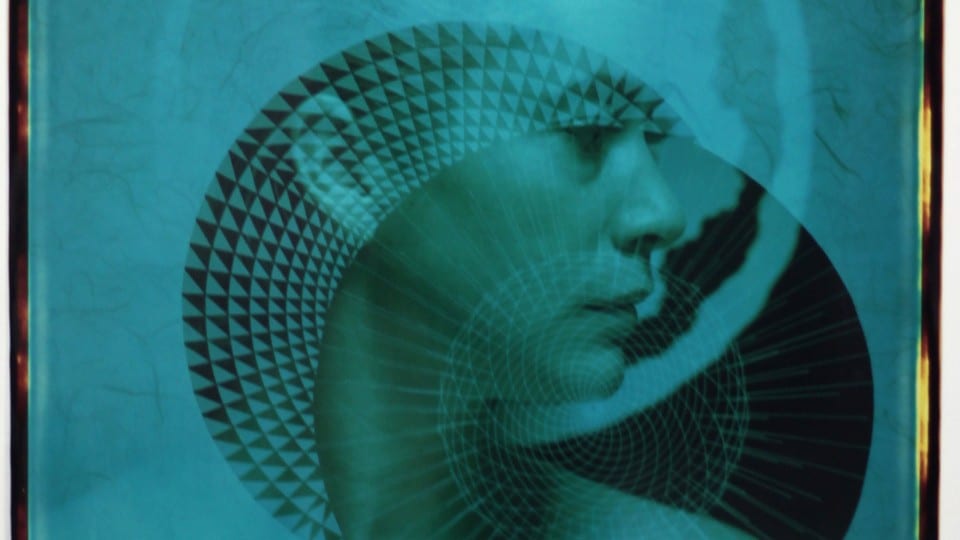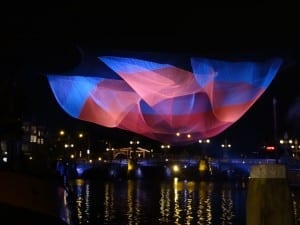Ellen Carey came of age artistically in the 1980s, which was a decade in photography that saw radical innovation, and a real move away from merely representational and reportorial image-making. Carey’s investigations in the ensuing years have charted a course increasingly abstract, boldly experimental, arriving a place where, as she puts it, “subject matter is not there.” Her trajectory in the art world began at the University of Buffalo, in the late 1970s, and continued to develop when she moved to New York City in 1979. Carey often makes images without a camera, in a process she calls ‘painting with emulsion.’ When she trains her camera’s eye onto an object, the resulting image may bear no relation to the subject. She uses light the way that abstract painters use paint. We speak to Carey about her inclusion in group exhibition Les années 1980, l’insoutenable légèreté at Centre Pompidou in Paris.
A: In a world where everyone walks around with a camera in their pocket, has the rise of the smartphone had an impact on Fine Art photography?
EC: Yes, I think it’s great for photography, as we’re now seeing a global visual culture. People think visually now; images transcend language barriers, age, race, economics. People are more open to images. With three-year-olds having smartphones, who knows what images we’re going to be seeing?
A: The exhibition at the Pompidou focuses on the 1980s. What is iconic about this decade, and what makes it culturally important today?
EC: We are now 25 years out from the 1980s, and the decade is being looked at with new eyes. 60s Pop and 70s Minimalism and Conceptualism have been reappraised, now it’s the turn of the 80s. There were barriers broken down then, innovation was not only allowed, it was expected. There was an ‘anything goes’ sort of chaos, graffiti art, neo-expressionism.
A: In your opinion, was it easier for artists to develop and establish themselves back then?
EC: I feel it was just different. There’s more to learn today. There’s social media. There was no gatekeeping. Today there’s the emerging artist, there’s the mid-career artist, you need to go up the ladder. In the 1980s, it was open territory – you could break rules. It was a meritology. Remember, early on there were almost no galleries for us. P.S. 1 (the Museum of Modern Art’s contemporary venue) had just opened up, and you had to go to museums and look in books to see art. New York was gritty, it was scary, a new territory for young artists – it was kind of like Blade Runner.
A: You call yourself a ‘lens-based artist’ rather than strictly a photographer. Can you describe the term abstract photography?
EC: All photographs are inventions and processes. Photography was always based on picture-signs: you had the portrait, the landscape, the still-life. With abstract photography, you don’t know what the picture is, or how it was made. I took out the picture signs. I got restless with straight photography, with the surface. You turn the camera on yourself. I started doing painted self-portraits.
A: It seems your investigations are akin to that of James Welling and Cindy Sherman, though of course her’s are not abstract.
EC: There are affinities and overlaps with what I do and what they do, as well as differences. My influences stem from the world of Dada, surrealism, and especially Man Ray. Russian Constructivism has also had a great influence on my development. With Jackson Pollock, for example, you had the gestalt of the brush, the thing itself. He took the canvas off of the stretcher, and put it on the floor. So, change of process. I stepped into the black box of the darkroom. Also tools are important; the Polaroid 20×24 was an innovation every bit as ground-breaking as anything Steve Jobs created.
Tim Barry
Ellen Carey’s work features in Les années 1980, l’insoutenable légèreté, until 23 May, Centre Pompidou, Paris. For more, visit www.centrepompidou.fr.
Follow us on Twitter @AestheticaMag for the latest news in contemporary art and culture.
Credits
1. Ellen Carey, Self Portrait, 1987. Courtesy Centre Pompidou © Photo Éric Simon.





